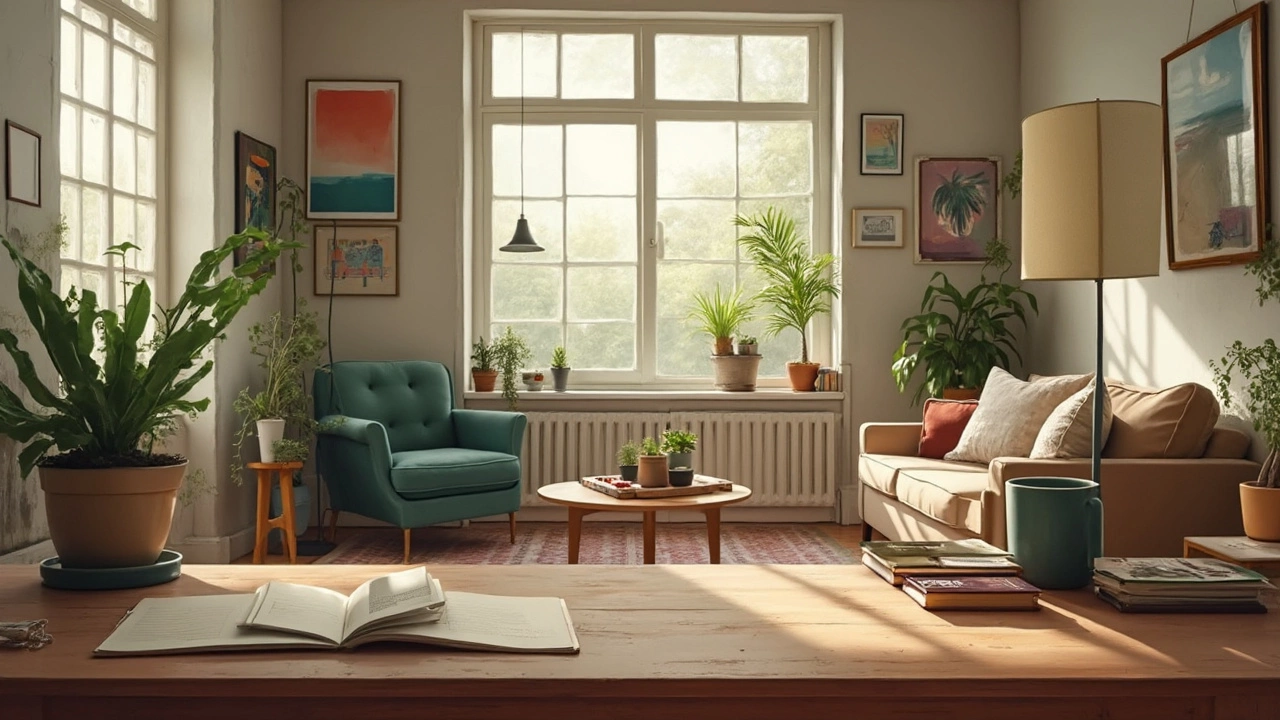So, you're earning $50,000 a year, and owning a home seems like a distant dream? Not so fast. While it might seem like a tight squeeze, there are ways to make it work if you're savvy about your choices.
First, understanding your budget is crucial. Experts often suggest that no more than 30% of your income should go toward housing costs. Let's do the math—that's around $1,250 a month. It’s not a lot when you consider mortgages, maintenance, and other expenses, but there are creative ways to stretch it.
One strategy is to target affordable housing markets. Regions where housing demand is lower often have cheaper homes. So, it might be worth checking out smaller towns or certain city suburbs where prices haven’t skyrocketed.
- Understanding the Budget
- Affordable Housing Strategies
- Best Regions for Budget-Friendly Homes
- Navigating the Mortgage Process
- Practical Tips for Saving and Budgeting
Understanding the Budget
Getting your head around a $50,000 annual income means you need to get real about your spending. When aiming for affordable housing, it's all about balancing your earnings with your lifestyle needs.
First off, tackle the 30% rule, which advises you to spend no more than 30% of your income on housing. For someone making $50,000 a year, that means about $1,250 a month should ideally cover your mortgage or rent, taxes, and insurance.
Breaking Down the Numbers
Let's see how the budget works out:
- Annual Income: $50,000
- Monthly Income (before tax): Approx. $4,166
- Max Housing Budget (30%): $1,250
Of course, you'll have other expenses like groceries, utilities, and maybe even a Netflix subscription. Keeping track of these helps you avoid financial stress.
Planning for the Extras
Your housing costs aren’t just the mortgage. Don’t forget property taxes, maintenance, and those unexpected repairs, like fixing that leaky roof. It’s smart to set aside a small emergency fund, even if it’s just a few hundred bucks a year, for these costs.
Thinking about buying in an area with lower property taxes or minimizing your utility bills can also help keep costs down. Every bit helps when you're on a budget.
Here's a quick snapshot of potential hidden costs that can sneak up:
- Homeowners Insurance
- Water/Sewer Bills
- Electric/Gas Bills
- Routine Maintenance Costs
Taking the time to jot these down when planning your purchase can save you a lot of headaches down the line. Owning a home on $50,000 isn’t impossible; it just needs a pinch of planning and a spoonful of strategy.
Affordable Housing Strategies
So, you're seriously considering buying a house with a $50,000 salary. Guess what? It's doable with some smart strategies. Let's dig into ways you can make it work.
Look for Government Programs
Depending on where you live, there could be government programs aimed at helping low to moderate-income families buy a house. For instance, programs like FHA loans in the US offer lower down payments and sometimes lower interest rates. Investigate what’s available in your area.
Consider Fixer-Uppers
A cheap houses option is looking for properties that need a little TLC. A fixer-upper can cost substantially less upfront, and if you're handy (or willing to hire help), you could add value to your property over time.
Shared Equity Schemes
These schemes allow you to buy a share of a property, typically with help from housing associations. You pay rent on the portion you don’t own, which is usually affordable.
Community Land Trusts
Another option is looking into community land trusts. These trusts own the land and sell you the house, keeping overall costs lower. The catch? You might not be able to sell your home for profit without restrictions, but it's a great option for first-time homeowners.
Create a Detailed Budget
It's one thing to dream and another to plan. Know your numbers—consider everything from utilities to unexpected maintenance. Set a solid budget and stick to it. Having clear figures helps more than you'd think.
| Strategy | Potential Savings |
|---|---|
| Government Programs | 6% lower interest rates |
| Fixer-Uppers | Up to 20% less on purchase price |
| Shared Equity | 50% lower purchase cost |
Finally, don't forget to reach out to real estate agents who specialize in affordable housing. It's amazing what word of mouth can do, and they might have insider tips up their sleeves.

Best Regions for Budget-Friendly Homes
Finding affordable housing can feel like hunting for a needle in a haystack. But some regions remain accessible for those on a budget. Let's dive into where to start your search.
Midwestern United States
The Midwest is often underrated when it comes to affordable housing. Cities like Cleveland, St. Louis, and Indianapolis offer significantly lower home prices compared to coastal counterparts. Plus, the cost of living is generally lower, which means your $50,000 can stretch a lot further.
The South
States like Alabama and Mississippi have some of the cheapest housing markets in the country. While you might not find sprawling urban centers, the charm of small towns and the lush landscapes make up for it. The cost of living is also quite manageable.
Rural New Zealand
Closer to home, certain regions in New Zealand still offer reasonably priced homes. Areas in the South Island, like Invercargill, have kept prices modest compared to bustling Auckland. And let's not forget about the stunning natural beauty these places provide.
Pockets of Australia
Though Australia's housing market can be pricey, check out areas in Tasmania or certain parts of Queensland. They offer more affordable options with a relaxed lifestyle. You'll be surprised at what you can find if you're open to a change of scenery.
| Region | Average Home Price |
|---|---|
| Midwest, USA | $150,000 |
| The South, USA | $130,000 |
| Rural New Zealand | NZ$350,000 |
| Tasmania, Australia | A$300,000 |
Being open to relocating or considering regions you hadn't thought of before can make a big difference. Sometimes, finding your ideal cheap house means looking beyond the usual hotspots. Use these insights to hunt down your next affordable home.
Navigating the Mortgage Process
If you're living on a $50,000 annual income and eyeing that dream home, getting your mortgage right is a big piece of the puzzle. Let’s break down the steps to make it less of a headache.
Understanding Mortgage Basics
A mortgage is pretty much a fancy word for a home loan. Securing a mortgage starts with knowing your budget and being honest with your lender about what you can afford. Lenders like to see that you can comfortably handle the monthly payments alongside your other expenses.
Pre-Approval Is Key
Before you start house hunting, it’s wise to get pre-approved for your mortgage. This shows sellers you’re serious and can afford the house. It also helps you understand how much the bank is willing to lend you. Pre-approval involves proving your income, credit score, and other financials.
Shop Around for Rates
Mortgage rates can make a huge difference in your monthly payments. Don't just settle for the first offer you get. Shop around and compare rates from different banks and lending institutions. Even a slight difference in rate could save you thousands in the long term.
Down Payments and PMI
A bigger down payment can reduce your monthly costs and eliminate the need for PMI—Private Mortgage Insurance—which lenders charge if your down payment is less than 20%. But hey, don't worry if 20% isn't doable; many programs cater to lower-income households with smaller down payments.
Fixed vs. Variable Rates
Another choice to make is between a fixed or variable rate mortgage. A fixed rate means your payment stays the same, which helps with budgeting. A variable rate might offer lower initial costs, but remember, it can change down the line.
Here's a quick comparison of mortgage rates to get you started:
| Bank | Fixed Rate | Variable Rate |
|---|---|---|
| Bank A | 3.5% | 3.2% |
| Bank B | 3.7% | 3.1% |
Navigating this process isn’t just about checking boxes. It’s about making informed choices that suit your income and lifestyle, so you can turn that $50,000 salary into a stepping stone rather than a roadblock.

Practical Tips for Saving and Budgeting
If you're trying to snag a home on a $50,000 budget, smart saving and budgeting are your best friends. You might need to get creative or even make some sacrifices, but it's doable. Here are some practical tips to help you save up and stretch those dollars further.
Set a Realistic Savings Goal
Determine how much you need for a down payment. Ideally, strive for at least 20% of the house price to avoid private mortgage insurance (PMI), which can add to your monthly costs.
Trim Unnecessary Expenses
Take a good hard look at your spending. Cut out non-essentials like dining out frequently or those countless streaming subscriptions. It's amazing what little sacrifices can add up to.
- Reduce grocery bills by meal planning and buying in bulk.
- Downsize or sell unused items. You'd be surprised at how much you can make from a garage sale or selling things online.
Boost Your Income
Consider part-time gigs or freelance work. Even if it's just a few hours a week, it can significantly boost your savings over time. Platforms like Upwork and Fiverr have made it easier than ever to find side hustles.
Utilize Budgeting Apps
There are numerous apps like Mint or YNAB (You Need A Budget) that can help you keep track of where your money goes and identify areas for improvement.
Consider Low-interest Savings Accounts
Put your savings in a high-yield savings account. It won’t make you rich, but every little bit of interest is more money toward your goal.
| Expense | Percentage of Income |
|---|---|
| Rent/Mortgage | 30% |
| Utilities | 10% |
| Groceries | 15% |
| Transportation | 10% |
| Savings | 10-15% |
With these tips and a bit of perseverance, buying a home on a $50,000 budget is more possible than you might think. Stay focused on your goal, and soon you could have the keys in your hand!
